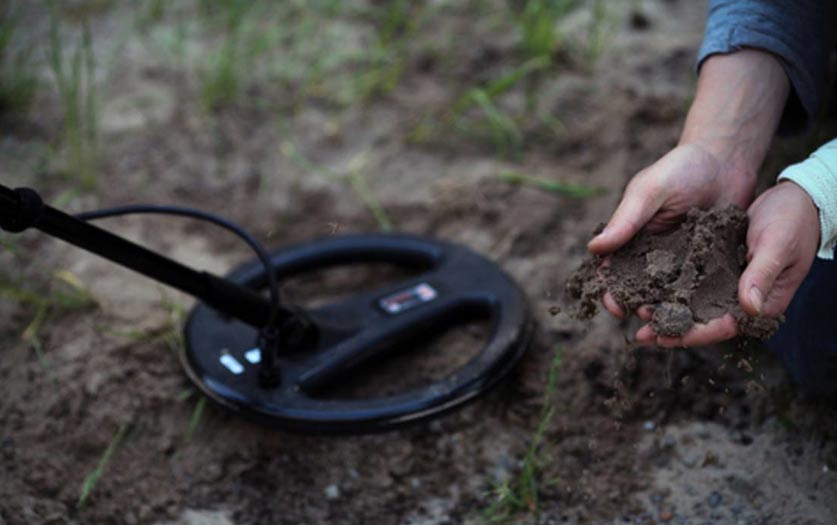History wars: archaeologists battle to save our heritage from the nighthawks
Like grave-robbers, they come at the dead of night, wearing camouflage and dark clothes to avoid detection. Armed with increasingly powerful metal detectors, they work their way across the fields, digging holes wherever they find a target. Landowners wake to find their crops trashed and dotted with holes. Nobody can ever know what they found, as any artefacts are rapidly sold through online auctions or smuggled out of the country. They are called nighthawks – and they are the bane of archaeologists across the country.
The English landscape is filled with ancient sites – from prehistoric forts and barrows, to Roman towns and villas, medieval villages and industrial remains. Each archaeological site has a unique story to tell and will often contain buried artefacts that help us to understand our history. Around 37,000 of these sites have been identified as ancient monuments: protected from development and treasure hunters.
For many years, archaeologists have been deeply divided on the subject of metal detecting. Some see detectorists as an army of keen amateurs, who go brave all weathers in the hope that one day, they will strike lucky. Provided that they work within the law and with the permission of landowners, they are generally seen as harmless, even beneficial.
Detectorists are encouraged to report their finds to the Portable Antiquities Scheme – a massive recording operation run through the British Museum – which maintains a database of every item that has been reported. The website contains pictures of more than 1m objects, based on more than 700,000 records. This huge amount of data has helped archaeologists to find new sites and to better understand little-known periods of our history as represented by artefacts, rather than buildings and physical remains. Some suspect that this is just the tip of the iceberg of the many important finds that have been made – possibly as many as 4m – in recent years.
But there is a dark side to this seemingly harmless hobby. A small minority of treasure hunters try to evade permissions and go onto well-known, protected sites, wielding powerful metal detectors with the intention of stealing valuable artefacts.
England and Wales are unusual in that metal detecting is legal, provided that detectorists avoid ancient monuments and declare any treasure (defined as gold and silver or prehistoric metalwork) to the Coroner. In Scotland and Northern Ireland, detectorists must obtain a licence to search anywhere, while in most of continental Europe, metal detecting is a crime.
The rather more liberal approach taken in this country means that we now know about many more sites than archaeologists alone could have discovered. But it also means we have a serious problem with looting which, until now, authorities have largely failed to face up to: police often neglected to prosecute and magistrates were reluctant to convict. In the past, the ambiguous legal position on heritage crime has often allowed those arrested to plead ignorance, by claiming they didn’t realise that the site was protected, or that they even needed permission.
Caught in the act
In a joint investigation between the University of Bristol and the BBC, we set out to discover just how prevalent night-hawking is. Fortunately, we now have new motion sensing, infrared camera traps, which can film at night time without artificial lighting – a technology largely developed for wildlife photography.

Infrared cameras catch a nighthawk in action. BBC/University of Bristol, Author provided
We set up six of these cameras around a well-known Roman settlement and protected ancient monument in the Cotswolds, and retired for a week to see what we might capture. There were, of course, several deer and foxes, but to our amazement our cameras also caught the full details of a night-hawking operation.
The group arrived at 10.30pm, wearing full camouflage and beanie hats, and armed with powerful metal detectors. They stayed for around four hours, and we filmed them scanning the fields and digging holes across the site. A getaway car finally picked them up at 2am. We have no idea if they found anything significant or not but they were clearly equipped with the intention of looting, just as a burglar with a crowbar is equipped to steal. The investigation aired on Inside Out West, and you can view the whole episode on BBC iPlayer.
Coincidentally, around the time of our investigation, the Sentencing Council – which produces independent guidelines on sentencing for the judiciary – revised its recommendations on heritage crime. Now, night-hawking is classed as an aggravated harm, along with stealing from war memorials and stripping church roofs.
We hope that stiffer sentences will deter the nighthawks, and that new technologies will make it much easier to collect evidence of wrongdoing. Now, for the first time, it looks like we might just have the tools we need to defeat the nighthawks, and save our heritage for future generations.
Featured image: The treasure-hunters. Working with a metal detector. Credit: Lamzin Vladimir / Dreamstime.
The article ‘History wars: archaeologists battle to save our heritage from the nighthawks’ by Mark Horton was originally published on The Conversation and has been republished under a Creative Commons license.




















Comments
Yeh, Fu** me for digging in my own country for my own ancestral artifacts. Get a grip, the queen and the governments dont own everything, they can put words together in certain patterns all day to make it seem like they do, but they don't.
Kinda surprised they were not described as having high powered automatic assault metal detectors. Seems a bit sensational. The problem is not the metal detectors or the strength of them but rather that people want to loot artifacts.
"England and Wales are unusual in that metal detecting is legal"
In the USA, it is legal but of course we have our own regulations. It seems to me there should be a balance between individual rights and the authoritarian imposition of unelected and unaccountable gatekeepers dictating to society how land is used and history appreciated.